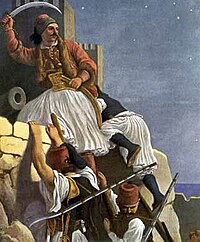Siege of Patras (1821)
| Siege of Patras | |||||||
|---|---|---|---|---|---|---|---|
| Part of the Greek War of Independence | |||||||
 Athanasios Kanakaris during the siege of Patras by Peter von Hess | |||||||
| |||||||
| Belligerents | |||||||
 Greek revolutionaries Greek revolutionaries |  Ottoman Empire Ottoman Empire | ||||||
| Commanders and leaders | |||||||
| Germanos of Patras Athanasios Kanakaris Andreas Londos Benizelos Roufos Panagiotis Karatzas Ioannis Papadiamantopoulos | Unknown | ||||||
| Strength | |||||||
| 1,500 | Unknown | ||||||
| Casualties and losses | |||||||
| Unknown | Unknown | ||||||
The siege of Patras was one of the first events of the Greek War of Independence. After the outbreak of the revolution, the Greeks under the leadership of the primates of Patras, captured the city and destroyed the Muslim quarter. The Greeks tried to capture also the main fortress of the city.

In April, an Ottoman army lifted the siege and destroyed a large part of the city, with Patras remaining under Ottoman control almost until the end of the war (1828).
The consul of France in the city at the time was Hugo Pouqueville, brother of François Pouqueville, and for Great Britain Philip James Green.

- v
- t
- e
- Wallachian uprising
- Kalamata
- Navarino
- Patras
- Alamana
- 1st Acropolis
- Gravia
- Valtetsi
- Doliana
- Lalas
- Vasilika
- Drăgășani
- Sculeni
- Vasilika
- Trench
- Tripolitsa
- Samothrace
1822–1824
- Acrocorinth
- Chios
- Naousa
- Chios (naval)
- Peta
- Expedition of Dramali
- Dervenakia
- Agionori
- Battle of Nauplia
- 1st Messolonghi
- Karpenisi
- 2nd Messolonghi
- Kasos
- Psara
- Samos
- Gerontas
Egyptian intervention (1825–1826)
- Kremmydi
- Andros
- Sphacteria
- Maniaki
- Mills of Lerna
- Alexandria
- 3rd Messolonghi
- Mani
- 2nd Acropolis
- Arachova
- Kamatero
- Phaleron
Great powers intervention (1827–1829)
- Volos
- Itea
- Navarino
- Morea expedition
- Chios expedition
- Martino
- Koronisia
- Petra
Aftermath
In February 1822, after a victorious battle outside Patras (Battle of Girokomio), the Greeks under Theodoros Kolokotronis began again the siege of the fortress.[1] It was after the defeat in the Battle of Peta, which allowed the Ottoman army to pass to Achaea, and the Expedition of Dramali that brought an end to the siege.
References
- ^ Tompros, Nikos; Kanellopoulos, Nikos (October 2021). "The Battle of Peta (1822): when the Philhellenes fought like the Greek irregulars". Byzantine and Modern Greek Studies. 45 (2): 222–239. doi:10.1017/byz.2021.5. ISSN 0307-0131.
38°15′00″N 21°44′00″E / 38.2500°N 21.7333°E / 38.2500; 21.7333









